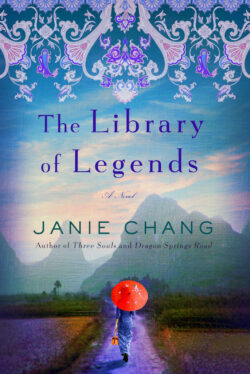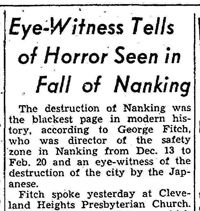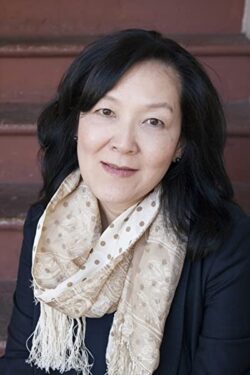1094 Escape from Nanking, 1937
The Library of Legends
by Janie Chang
Toronto: HarperCollins Canada, 2020
$22.99 / 9781443456050
Reviewed by Valerie Green
*
 The year is 1937. The place is eastern China.
The year is 1937. The place is eastern China.
The story of The Library of Legends by Janie Chang is a true account of the evacuation of university students from the city of Nanking across thousands of miles of land to western China in order to escape the Japanese bombing at the start of the Chinese/Japanese war. It is a powerful story.

Janie Chang’s novel is based on facts from her own family history, but her characters are purely fictional. Chang also weaves in a real-time story with mythical legends and mystical beasts in Chinese history. The result is a commanding tale of mystery, tragedy, history and the power of love through eternity.
Chang’s main characters are nineteen year-old Hu Lian, her fellow students, her professors and their servants as they leave the safety of Minghua University in order to escape the Japanese. Not only will their own safety be at risk along a hard and treacherous journey ahead, but they are also entrusted to take with them a 500 year-old library collection of myths and folklore known as The Library of Legends. This collection must be saved at all costs because it contains all of China’s history for the past centuries.

Along the journey many strong friendships are formed and even an uncertain romance between Lian and her friend Shao, but there is also danger within their own group, which they soon become aware of. One classmate is suddenly murdered and another is arrested because of possible Communist connections, and Lian fears for her own safety because of her own secret past which she and her mother have been forced to live with and had hoped to escape from. These stories increase the intrigue as the students travel west.
Eventually Lian decides to leave the group accompanied by her friend Shao and his maidservant Sparrow, in order to re-connect with her mother in Shanghai.
Janie Chang’s novel is beautifully told and powerfully threaded with mystic tales and legends from China’s history. I found that sometimes these mystical legends tended to interrupt the natural flow of the story but eventually the reader will understand the necessity of these interruptions because some of the immortals in the legends are actually living in real time among the mortals of 1937 China.
Chang’s descriptive passages are delightful as she brings wartime China to life. Examples such as:
The clear skies above, the glorious moon and starlight, they all mocked her. They travelled their arcs each night, untroubled by the woes of mere mortals (p. 205).
[M]ortals who had never seen a herd of gilin [A Chinese mythical animal] awaken spring as they dashed into the woods, or watched a Star live out her lonely quest (p. 356).
I can wait for him. I have the advantage of eternity. You only have this life. You will know when I am gone (p. 357).
These passages and others like them will move the reader to a better understanding of the intermingling of stories of the present with myths and legends from ancient history.
The war changes China forever. It is a piece of history not often written about and one I was certainly not aware of — the exodus of young students across China in 1937. Their safety and future education plus the safety of The Library of Legends are paramount as the library must be guarded and preserved at all costs. This is a wonderful mix of the important magnitude of the past coupled with the educational consequences of the future.

Janie Chang has made excellent use of maps throughout the book that help explain the journeys. She has also explained how and why she came to write this story. Her own father was a student at the Nanking University (not her fictional Minghua University) when war with Japan broke out and rather than return to his family, he stayed with his fellow students and professors to continue his studies. When the university was evacuated he chose to travel by foot with them across thousands of miles of rough territory believing that the education of China’s young people was too important to lose.
In re-telling this true story, Chang describes in her fictional tale all the hardships endured along the way — the long, painful hours of walking; carrying heavy backpacks, sleeping on hard stone floors of temples throughout the countryside and always aware of the possibility of overhead aircraft bombing them — which they desperately tried to avoid.
Some of the characters her father described to her are re-created in her novel. She goes on to say that, “decades later my father still suffered nightmares in which he had been captured by Communist spies … who were going to murder him.” From the time her father was fourteen, when he left for boarding school, it was another fourteen years before he saw his family and his hometown again at the age of twenty-eight. This story, written by an author who grew up listening to the stories of her ancestors, moved me to want to read more of her writings. I am sure it will do so for other readers too. It is a very powerful novel.
Janie Chang is a Canadian novelist who has a degree in computer science and is a graduate of The Writer’s Studio at Simon Fraser University. Both of her earlier books, Three Souls and Dragon Springs Road, were long-listed for the International Dublin Literary Award. She was born in Taiwan, but has lived in the Philippines, Iran, Thailand, and New Zealand. She now lives in Vancouver.
*

Valerie Green was born and educated in England where she studied journalism and law. Her passion was always writing from the moment she first held a pen in her hand. After working at the world-famous Foyles Books on Charing Cross Road, London, followed by a brief stint with M15 and legal firms, she moved to Canada in 1968 where she married and raised a family, while embarking on a long career as a freelance writer, columnist, and author of over twenty non-fiction historical and true-crime books. She is currently working on her debut novel Providence, which will be published soon as the first of The McBride Chronicles, an historical four-generational family saga bringing early BC history alive. Now semi-retired (although writers never really retire!) she enjoys taking short road trips around BC with her husband, watching their two beloved grandsons grow up and, of course, writing. Editor’s note: Valerie has recently reviewed books by Gina McMurchy-Barber, Eric Walters, Gail Anderson-Dargatz, Alan Twigg, Leslie Howard, D.B. Carew, Caroline Adderson, and Dean Unger.
*
The Ormsby Review. More Books. More Reviews. More Often.
Publisher and Editor: Richard Mackie
The Ormsby Review is a journal service for in-depth coverage of B.C. books and authors. The Advisory Board consists of Jean Barman, Wade Davis, Robin Fisher, Cole Harris, Hugh Johnston, Patricia Roy, David Stouck, Maria Tippett, and Graeme Wynn. Scholarly Patron: SFU Graduate Liberal Studies. Honorary Patron: Yosef Wosk. Provincial Government Patron since September 2018: Creative BC
“Only connect.” – E.M. Forster
One comment on “1094 Escape from Nanking, 1937”